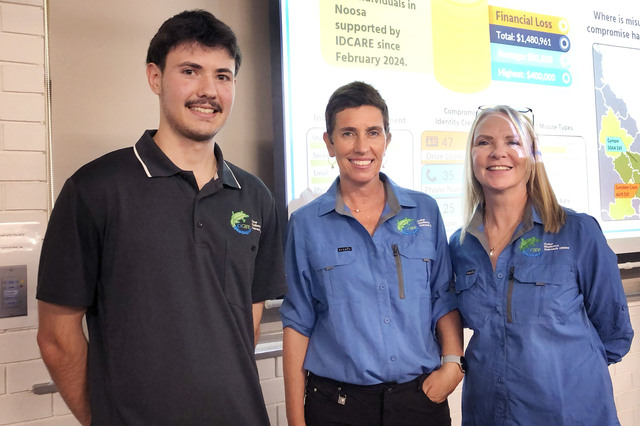Two hundred and twenty-eight Noosa residents were victims of scams in the past 12 months, costing them a total of about $1.5 million with an average individual loss of $30,000, one resident being scammed out of a whopping $400,000, according to a report by national identity and cyber support service, IDcare, on the victims they helped.
Last Friday IDcare outreach and engagement national manager Kathy Sundstrom, outreach team member Shona and data analyst Jack of the Kawana-based not for profit charity, that has for a decade been the national support service for people impacted by scams, cybercrime or identity theft, spoke to guests at U3A on the methods scammers use to target their money and how to protect themselves.
“Cybercrime cost the world $9.5 trillion in 2024,” Kathy said.
“What caused the most financial loss (in Australia) in the past year, and this rarely changes, is nearly always investment scams.
“There was $24million in the month of January in recorded losses in investment scams in Australia.
“We have hundreds of people call in every day. Everybody thinks it’s not going to happen to them, until it does. It’s so common.”
The age group reporting most scams to IDcare is 35-44 year olds, with the highest financial losses, mostly retirement savings lost in investment scams are reported in the 65-74 year demographic.
“We were concerned about Noosa because our data was showing Noosa was so much higher than other regions across Australia. Noosa was in the top 15 most vulnerable areas across Australia in the past 12 months,” Kathy said.
“What do criminals want?” Shona asked.
“They’re after our money and how do they do that, they target our credentials, and the drivers license is the top target.
“With a drivers license they can phone a bank and open an everyday business account and that’s the only piece of ID they need. If they want to open a line of credit they need more, the top 100 points such as a drivers license, Medicare card and passport.
“They are able to collect bits of information from data breaches and piece together the 100 points and open lines of credit or open a phone account.”
Jack, who monitors the dark web and platforms where scammers talk to each other, said this was where they do deals selling credentials.
“They may have phished them, there may have been a data breach, and they sell them on, to maybe set up bank accounts, get lines of credit, and there’s no repercussions for them because they’re not their identities,” he said.
Kathy warned the guests to be alert to all types of scams through phone calls, texts and social media.
“Be very suspicious if you’ve getting calls from anybody, your bank, the government, and they want details of your accounts,” she said.
“When it comes to investment scams they are highly sophisticated. They are very talented in making their fake websites look like an investment platform where you see your money going up, you see your money going down.
“They even create fake trading groups where you go on and you see people talking and you feel connected to something.
“Celebrity impersonated scams are very popular.
“Relationship scams don’t just lead to a broken heart, it leads to you transferring funds to that person or joining in their investment opportunity.
“Most of the people in relationship scams say they were so careful, they never thought it would happen to them. They checked all the red flags. It’s a slow burn, it takes place over months where something might happen where they need assistance or they might introduce them to a cousin who introduces them to crypto.
“In January a person lost $230,000 in a telephone scam. A person called pretending they were a woman’s bank and telling them there was a problem with her account. She gave them remote access and the next thing she lost $230,000.”
Shona said when people contact IDcare they want to know how it happened. Often people don’t know how it happened, she said.
If you have been scammed IDcare recommend a three-step response.
“First thing is contact your bank or financial institution,” Kathy said.
“The reason for that, before you call police, or your family, they are the only ones who can protect the money in your account.”
Kathy said while recently working with the fraud team in a major bank she was shown how quickly money could be lost.
“You transfer money from your account to another. Within minutes it’s gone out of that other account either into cryptocurrency or an offshore account where your likelihood of getting the money back is very small,” she said.
“We know it’s about 15 per cent of scam victims get their money back. The sooner you report the greater the likelihood of getting some back.”
The second step is to contact IDcare.
“If you do get yourself in a situation you think you’ve been scammed or your identity has been stolen you can call us and get a case manager,” Shona said.
“We’ll give you a step by step plan how you can move forward safely and stop what’s happened. And it’s free.”
The third step is to spread the word about the scam.
“Scams thrive in silence,” Kathy said. “Telling other people, they’re less likely to affect anyone else.”
To help protect yourself from criminals the IDcare team recommended taking precautions to stop being an easy target.
“Stop, check, protect – when you get a message, take your time, treat everything you receive as suspicious. If you receive an email that says it’s from your bank or MyGov, check the email address,” Shona said.
“One of our best tips is to use the Apps from the Apps store then you know its a reliable, real text.
“If someone says they need remote access don’t do it.
“Don’t have the same password for everything. We recommend you use a password manager. There are free ones on your phone. Do a bit of research. You can use a notebook to write them down, keep it in a safe place. There are pitfalls to this but it’s better than having the same password for everything.
“Don’t get Google to save your password for you. If criminals get hold of your computer they’ll go into your computer manager and get hold of all your passwords.
“It’s important you set up multi-factor authentication on emails and Facebook. It stops 99 per cent of account takeovers. It’s quite an easy thing to achieve.
“Get your credit report. You’re entitled to a free credit report every three months.
“Stay informed. Criminals are always looking for ways to gain access.”
IDcare has a learning centre and fact sheets on its website.
IDcare finances itself through the creation and sale of reports on scams to different industries and receives some funding.









